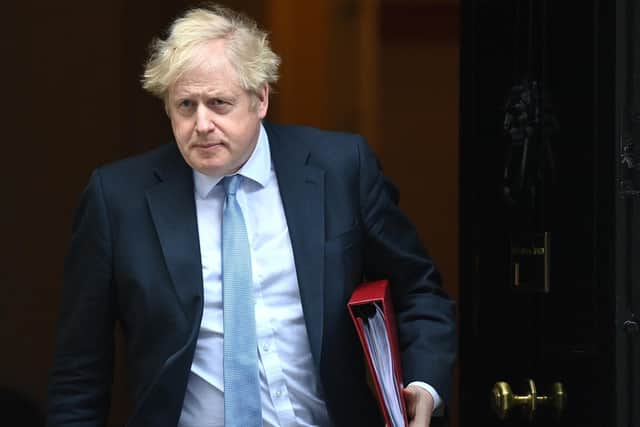Ukraine: Boris Johnson to meet NATO allies as more UK troops go on standby in eastern Europe
Foreign Secretary Liz Truss and Defence Secretary Ben Wallace are to meet their Russian counterparts in Moscow later.
The Prime Minister boarded a flight to Brussels where he is due to meet with Nato secretary-general Jens Stoltenberg.
Advertisement
Hide AdAdvertisement
Hide AdBoris Johnson is expected to reiterate an offer to strengthen the alliance’s defences should Russian aggression in eastern Europe increase.


Downing Street has announced one thousand British troops are being put on standby in case of a humanitarian crisis in eastern Europe if the current Russian military build-up leads to war.
Following the meeting, the Prime Minister is scheduled to fly to Warsaw in Poland for talks with the country’s leaders and to meet British troops stationed there, amid fears over a Russian invasion into neighbouring Ukraine.
At the same time, Foreign Secretary Liz Truss is in Moscow for talks with her counterpart, Sergei Lavrov, as Western powers continue to urge President Vladimir Putin to draw back from conflict.
British officials warned that any further Russian incursion into Ukraine would be a “humanitarian disaster” leading to a mass displacement of people, which would particularly affect countries like Poland and Lithuania.
It comes as tensions in the region mount. Today, it was confirmed Russia and Belarus are starting 10 days of joint military drills amid ongoing fears of a Russian invasion of Ukraine, with the US branding it a “escalatory" move.
Additional troops are being placed on readiness to provide a humanitarian response if required, although they could also be used to provide further support to allies in the region.
Meanwhile, 350 Royal Marines from 45 Commando are to begin deploying to Poland as part of a further strengthening of UK support to the country announced earlier this week.
Advertisement
Hide AdAdvertisement
Hide AdIn December the UK sent 100 Royal Engineers to the country after Moscow’s ally, Belarus, engineered a refugee crisis on the border.
Ahead of his visit to Warsaw, Mr Johnson insisted the West must stand firm in the face of Mr Putin’s “coercive diplomacy”.
He made clear that Nato could not accept a key Kremlin demand that there should be no further enlargement of the alliance.
“When Nato was founded, allies made an historic undertaking to safeguard the freedom of every member state.
“The UK remains unwavering in our commitment to European security,” he said.
“What we need to see is real diplomacy, not coercive diplomacy.
“As an alliance we must draw lines in the snow and be clear there are principles upon which we will not compromise.
“That includes the security of every Nato ally and the right of every European democracy to aspire to Nato membership.”
Advertisement
Hide AdAdvertisement
Hide AdMr Johnson will also visit the alliance headquarters in Brussels, where he is expected to reiterate an offer to strengthen its defences when he meets Nato secretary-general Jens Stoltenberg.
It includes doubling the number of UK troops in Estonia, deploying more RAF jets to create a squadron in southern Europe, and dispatching a Type 45 destroyer and HMS Trent, an offshore patrol vessel, to the eastern Mediterranean.
Sir Keir Starmer will also meet Mr Stoltenberg on Thursday as the Labour leader strives to break with the party’s perceived weak stance on defence under his predecessor, Jeremy Corbyn.
In an interview with The Times, Sir Keir said “we are firm and united in our support for Nato” and argued that Mr Johnson’s standing on the world stage has been weakened by the scandals in No 10.
“His authority has been diminished because of the various activities over the last few months,” he said.
Russia currently has an estimated 130,000 troops massed along the border with Ukraine, prompting fears that it is preparing for a full-scale invasion.
Defence Secretary Ben Wallace said Britain is sending 1,000 troops to eastern Europe to prove to Russia that Nato is “not flaky”.
He told BBC Radio 4’s Today programme: “What this is really about is saying to President Putin, ‘Nato is not flaky. Nato will stand by its members, big or small’.”
Advertisement
Hide AdAdvertisement
Hide AdThe Cabinet minister added: “We want a dialogue, we want a way through this, but also Russia is now deploying over half its combat troops of a whole nation of Russia on the borders of Ukraine and in Belarus, and we’re not just going to let that happen without Nato having a response to defend its own members.”
Mr Wallace said the troops could end up in any Nato country where there are consequences of an invasion of Ukraine including the Baltic states, Poland, Romania and Nordic nations.
“Should Russia invade Ukraine I think we can expect very large movements of people as refugees and that in itself can be very destabilising to small and medium-sized states,” he said.
He insisted the sanctions threatened against Russia if it invades Ukraine will be ready in legislation soon.
“We’ve been all working very hard to have a raft of sanctions ready to go, I think you will see those pretty soon,” he said.
French President Emmanuel Macron, who met Mr Putin in Moscow earlier this week, said the Russian president had told him he is not seeking to escalate the situation.
However, with large-scale Russian military exercises about to begin in Belarus, which also borders Ukraine, there are fears they could be cover for an attack.
While there is no appetite among Western powers for direct military intervention in Ukraine, which is not a Nato member, they have warned of crippling sanctions in the event of any Russian incursion.
Advertisement
Hide AdAdvertisement
Hide AdAfter touching down in Moscow, Ms Truss said Russia must immediately withdraw its forces and respect Ukraine’s sovereignty or face “severe consequences”.
“Any incursion would be a huge mistake.
“Diplomacy is the only way forward and Russia must pursue that path,” she added.
